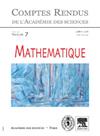亚纯函数导数的Picard-Hayman行为
IF 0.7
4区 数学
Q2 MATHEMATICS
引用次数: 0
摘要
设f是C上的一个超越亚纯函数,P (z),Q(z)是两个多项式,具有degP (z) > degQ(z)。本文证明了:如果f (z) = 0⇒f ' (z) = a(一个非零常数),除了可能有有限多个,则f ' (z)−P (z)/Q(z)有无穷多个零。我们的结果扩展或改进了Bergweiler-Pang, pang - nev - zalcman, Wang-Fang, and author等人的一些先前的相关结果。2020数学主题分类。30D35, 30D45。资金。国家自然科学基金资助项目(批准号11471163)。2020年1月7日收稿,2020年7月4日收稿。本文章由计算机程序翻译,如有差异,请以英文原文为准。
Picard-Hayman behavior of derivatives of meromorphic functions
Let f be a transcendental meromorphic function on C, and P (z),Q(z) be two polynomials with degP (z) > degQ(z). In this paper, we prove that: if f (z) = 0 ⇒ f ′(z) = a(a nonzero constant), except possibly finitely many, then f ′(z)−P (z)/Q(z) has infinitely many zeros. Our result extends or improves some previous related results due to Bergweiler–Pang, Pang–Nevo–Zalcman, Wang–Fang, and the author, et. al. 2020 Mathematics Subject Classification. 30D35, 30D45. Funding. This work was supported by NSFC(Grant No.11471163). Manuscript received 7th January 2020, accepted 4th July 2020.
求助全文
通过发布文献求助,成功后即可免费获取论文全文。
去求助
来源期刊
CiteScore
1.30
自引率
0.00%
发文量
115
审稿时长
16.6 weeks
期刊介绍:
The Comptes Rendus - Mathématique cover all fields of the discipline: Logic, Combinatorics, Number Theory, Group Theory, Mathematical Analysis, (Partial) Differential Equations, Geometry, Topology, Dynamical systems, Mathematical Physics, Mathematical Problems in Mechanics, Signal Theory, Mathematical Economics, …
Articles are original notes that briefly describe an important discovery or result. The articles are written in French or English.
The journal also publishes review papers, thematic issues and texts reflecting the activity of Académie des sciences in the field of Mathematics.

 求助内容:
求助内容: 应助结果提醒方式:
应助结果提醒方式:


